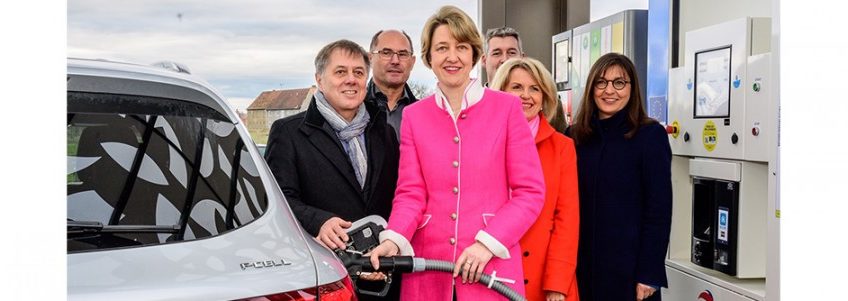The hydrogen infrastructure in Germany continues to grow: the latest H2 filling station started operation in Biebelried on January 10, 2020 – electric vehicles with fuel cells can now be refuelled at the TOTAL station at Würzburger Straße 55 in Biebelried. The filling station was built by the joint venture H2 MOBILITY together with its consortium partners TOTAL and Linde. The overall number of public H2 filling stations thus grows to over 80 in Germany, of which 17 are located in Bavaria.
Hydrogen mobility is a powerful form of electric mobility. On board of the vehicle, a fuel cell generates electric power to drive the vehicle by reacting hydrogen with oxygen from the air. The fueling process for hydrogen vehicles is comparable to natural gas refuelling. Energy for more than 500 kilometers can be refilled within just five minutes. In addition to passenger cars, hydrogen is also suitable as an energy carrier for e-mobility in the commercial vehicle sector. Since hydrogen can be produced from water by electrolysis using renewable electricity, it is also the central link between the transformation of the energy system and the mobility sector.
The hydrogen filling station in Biebelried was built by H2 MOBILITY, a joint venture of Air Liquide, Daimler, Linde, OMV, Shell and TOTAL, which has set itself the goal of reaching the number of 100 filling stations in Germany shortly. This would mark an important step towards the nationwide supply of hydrogen as well as the market launch of hydrogen vehicles. The hydrogen station corresponds to the latest state of the art technology provided by Linde. The plant has a capacity of around 200 kilograms of hydrogen – enough to refuel 40 to 50 vehicles a day.
Since 2002 TOTAL Deutschland has been involved in research and pilot projects to build the hydrogen infrastructure. There are currently 22 H2 filling stations in TOTAL’s network, and further projects in Rastatt, Erfurt, Neuruppin and Hamburg are nearing completion or are under construction. Another project in Saarbrücken is in the planning stage.
“In my view, hydrogen is a key raw material that is indispensable for achieving our climate targets. With a national hydrogen strategy, the Federal Government will therefore set the course for Germany to become the world’s number one player in this technology”, explained Dr. Anja Weisgerber, member of the German Bundestag, spokesperson for environmental and climate policy of the CDU/CSU parliamentary group in the German Bundestag. “The time for hydrogen technology has come.”
Barbara Becker, member of the State Parliament of Bavaria: “Hydrogen is an important component for the energy transition in the transport sector. In order to enable the use of sustainable, alternative drive technologies in everyday life, the necessary infrastructure must be further expanded. The hydrogen filling station at the Biebelried traffic junction is a very important contribution to the region”.
“Hydrogen mobility offers the opportunity for high-performance electromobility with considerable advantages for passenger cars over long distances, but especially for commercial vehicles.”, explained Bruno Daude-Lagrave, Managing Director of TOTAL Deutschland GmbH. “However, the transformation of mobility towards more environmentally friendly solutions is not an easy task – therefore we highly appreciate the political support for more technological diversity in the electromobility sector, which we are proactively promoting with the network expansion in Germany”.
Nikolas Iwan, Managing Director at H2 MOBILITY Deutschland GmbH & Co. KG: “Hydrogen plays an essential role in the transformation of the mobility sector. High range, short refuelling time and zero local emissions are the decisive criteria. H2 MOBILITY Deutschland is building the necessary infrastructure for this.”
The H2 filling station near the Biebelried interchange is located directly at a central traffic junction: the highly used A3 motorway between Frankfurt and Nuremberg as well as the north-south link along the A7 motorway.
The hydrogen station in Biebelried is supported by the European Commission in the trans-European Transport Network (TEN-T CEF) in the Connecting Hydrogen Refuelling Stations project (COHRS).


